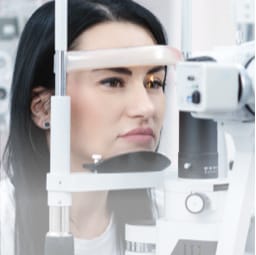Find Help Preserving Your Vision
Eye disease may not be something you think about very often. And you may wonder if there’s a possibility of developing an eye disease even if you have clear vision and healthy eyes. Besides, if your eyes see and feel normal, is there any cause for concern?
Many eye diseases develop without any symptoms. But our team has the tools, tech, and training to detect these issues early and set you on the path towards managing them.
All you have to do is book an appointment with Total Vision Hercules, formerly Hercules Optometry Group, and we’ll be ready to find the help you need.
Common Eye Diseases & Conditions
The risk of developing an eye disease depends on many factors, including your health, health history, family health history, medication history, and more.
One of the only ways to detect and diagnose potential eye diseases is a comprehensive eye exam. Please speak to our team to determine how often you may need an eye exam, as frequency can change based on your overall health and eye health.
Some of the most common eye problems we help manage include:
Glaucoma
Glaucoma is a group of eye diseases that damage your optic nerve. In most cases, glaucoma is characterized by rising intraocular eye pressure (IOP), but some versions can occur even if your IOP is within normal limits.
As glaucoma progresses, you may lose peripheral vision or experience eye pain, nausea, or complete vision loss. Often, though, glaucoma progresses without noticeable symptoms.
Though there are several types of glaucoma, the 3 most common include:
- Open-angle glaucoma: Open-angle glaucoma occurs when your eye’s internal fluids can’t drain correctly even though your eye’s drainage angle (between the iris and pupil) remains open. This causes your intraocular pressure to slowly rise over time, eventually damaging your optic nerve and leading to vision loss.
- Closed-angle glaucoma: Closed-angle glaucoma occurs when the drainage angle between your iris and cornea shuts completely, which rapidly raises your intraocular pressure. When this happens, you may experience redness, nausea, eye pain, and sudden vision loss. Closed-angle glaucoma is considered a medical emergency that requires immediate attention.
- Normal-tension glaucoma: In some cases, you may experience optic nerve damage even if your IOP levels are within normal limits. This disease is known as normal-tension glaucoma. While doctors aren’t sure it occurs, we can detect it with a comprehensive eye exam.
Age-Related Macular Degeneration
Age-related macular degeneration (AMD) is one of the most common causes of vision loss in adults over 55.
AMD damages your macula, the central part of your retina responsible for providing crisp, clear central vision you use to read, drive, and see fine details. We can detect this disease with regular eye exams.
There are 2 different versions of this disease:
- Dry AMD: Dry AMD gradually thins your macula as you age, leading to vision loss. Optometrists aren’t sure how this occurs, but some believe there’s a link with the development of a lipid called drusen underneath your macula.
Wet AMD: Although wet AMD is much less common than dry AMD, it’s responsible for over 90% of AMD-related vision loss. It can occur if abnormal blood vessels leak fluids underneath your macula, causing it to swell. Wet AMD is considered a medical emergency and requires immediate attention.
Cataracts
Cataracts are the leading cause of blindness worldwide, but they are the most treatable eye condition.
As you grow older, proteins in your eye’s lens clump together, making your lens rigid and opaque over time. As this happens, this opacity can restrict the amount of light that enters your eyes, resulting in blurry, hazy, or milky vision.
Early cases of cataracts can be easily corrected with glasses or contact lenses. Still, only cataract surgery can remove the cataract entirely and is replaced with an artificial lens matched to your needs.
Diabetic Eye Disease
Diabetes is a systemic disease that can affect your teeth, heart, and eyes.
While diabetes can increase your risk of developing several different eye diseases, diabetic retinopathy and diabetic macular edema are the most common.
Learn more about how these diseases can affect your vision on our Diabetic Eye Exams page.


Call Our Team Today
Be prepared to manage your eye health with our help. You’ll find the care you need at Total Vision Hercules, formerly Hercules Optometric Group, to control your eye disease and preserve your vision. Please, book an appointment today!
Come See What We’re About

Where to Find Us
You can find us on the first floor of Aventine Apartments right on Sycamore Avenue. Find angled parking right outside with accessibility options available.
- (510) 799 7380
- (510) 799 7734
- [email protected]
- 1375 Sycamore Ave Suite 150E
- Hercules, CA 94547
Hours of Operation
- Monday: Closed
- Tuesday: 9:00 AM – 5:45 PM
- Wednesday: 10:00 AM – 7:00 PM
- Thursday: 9:00 AM – 5:45 PM
- Friday: 9:00 AM – 5:45 PM
- Saturday: 9:00 AM – 12:00 PM
- Sunday: Closed


Our Brands












